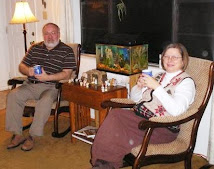I hope this post will apprise you of the difference between apprise and appraise.
After reading it, you can appraise it (and apprise me of your conclusions, if you so desire).
The confusion in usage between apprise and appraise has come to my attention on numerous occasions on the radio and in person in recent days. This is my appraisal.
Interestingly, people often use appraise when they mean apprise.
I do not believe I've ever heard people use apprise when they mean appraise.
People never think to say, "the jeweler apprised the gem collection." They do say (incorrectly) "Johnny's mom appraised his teacher that little Johnny would not be in school on Tuesday."
A simple rule of thumb: You apprise people. You appraise things. You appraise things for people. You apprise people of your appraisal of things.
To appraise means to put a value on. If you appraise me, you are putting a price tag on me. That's not nice.
To apprise means to inform.
Below, some dictionaries apprise us of their appraisal of the two words.
ap·praise
tr.v. ap·praised, ap·prais·ing, ap·prais·es
1. To evaluate, especially in an official capacity.
2. To estimate the quality, amount, size, and other features of; judge.
[Middle English appreisen, possibly from Old French aprisier, from Late Latin appretire : Latin ad-, ad- + Latin pretium, price]
The American Heritage® Dictionary of the English Language, Fourth Edition copyright ©2000 by Houghton Mifflin Company
Origin: 1400–50; late ME apraysen to set a value on, prob. a conflation of aprisen to apprize and preisen to praise (with sense of prize)
Dictionary.com UnabridgedBased on the Random House Dictionary, © Random House, Inc. 2009
ap⋅prise
verb (used with object), -prised, -pris⋅ing.
to give notice to; inform; advise (often fol. by of): to be apprised of the death of an old friend.
Origin: 1685–95; appris taught, informed, ptp. of apprendre; see apprehend
[French apprendre, appris-, from Old French aprendre, to learn, from Latin apprehendere, apprēndere; see apprentice.]
The American Heritage® Dictionary of the English Language, Fourth EditionCopyright © 2009 by Houghton Mifflin Company.
Word Origin & History
apprise: "to notify," 1694, from Fr. appris, pp. of apprendre "to inform, teach," lit. "to lay hold of (in the mind)," another metaphoric meaning of L. apprehendere (see apprehend).
Online Etymology Dictionary, © 2001 Douglas Harper
Tuesday, July 21, 2009
Saturday, July 18, 2009
Congratulations, Dalia!
It is a pleasure so soon after the 4th of July, our Independence Day, to welcome someone who has just become a citizen of the United States of America.
 Dalia is a friend and coworker at Affordable American Insurance. Here she is, with her three children, in front of Mt. Rushmore, a symbol of the best this country has to offer.
Dalia is a friend and coworker at Affordable American Insurance. Here she is, with her three children, in front of Mt. Rushmore, a symbol of the best this country has to offer.

Dalia had been studying and preparing for citizenship for years. Finally last week, her dream became a reality in a ceremony in which she, along with about 280 others from 75 countries, were officially naturalized citizens of the United States.

I have always been proud of the fact that ours is a nation of immigrants, welcoming new citizens from around the world. We have been greatly enriched by that process. We have provided sanctuary for the oppressed, economic opportunity for the disadvantaged, and hope for the downtrodden. In return, our nation has been greatly blessed by the hard work and creativity of our newest citizens.
 Welcome, Dalia. We hope you are as blessed to be here as we are to have you here!
Welcome, Dalia. We hope you are as blessed to be here as we are to have you here!

My family has only been in this land for a few generations, so I too am a beneficiary of the largesse of a nation that opens its heart to the world with these immortal words, engraved on a bronze plaque, mounted inside the Statue of Liberty:
The New Colossus
Not like the brazen giant of Greek fame,
Not like the brazen giant of Greek fame,
With conquering limbs astride from land to land;
Here at our sea-washed, sunset gates shall stand
A mighty woman with a torch, whose flame
Is the imprisoned lightning, and her name
Mother of Exiles. From her beacon-hand
Glows world-wide welcome; her mild eyes command
The air-bridged harbor that twin cities frame.
"Keep, ancient lands, your storied pomp!" cries she
With silent lips. "Give me your tired, your poor,
Your huddled masses yearning to breathe free,
The wretched refuse of your teeming shore.
Send these, the homeless, tempest-tost to me,
I lift my lamp beside the golden door!"
—Emma Lazarus, 1883
—Emma Lazarus, 1883
Friday, July 17, 2009
Central City Opera Weekend 2009
We just returned from another wonderful weekend in Central City, Colorado. We saw two of the three operas in the Central City Opera House Association season.


Here's the group gathered in the Dining Room.
On Saturday afternoon, we saw the musical "A Little Night Music" by Stephen Sondheim. It was a lighthearted farce, and we enjoyed it very much.
Reviews:
Daily Camera, July 6, 2009
Denver Post, July 3, 2009
Sunday afternoon we saw the opera "Lucia di Lammermoor." It was also very enjoyable but quite different from the Sondheim musical, not at all lighthearted.
The Denver Post, June 30, 2009
Daily Camera, June 29, 2009
The Denver Post, June 21, 2009

Incredibly, the Central City Opera House, opened in 1878 and in its 77th year after reopening in 1932, has never performed a Handel opera. This year, that all changes, with the performance of Rinaldo.
Reviews:
Denver Post, July 14, 2009
Denver Post, July 5, 2009

Central City Opera House, Opening Night, 1932

Former Weekends
Labels:
Bed and Breakfast,
CCO Weekend,
Central City,
Chase Creek Inn,
Opera
Saturday, July 04, 2009
Happy 233rd to the Declaration
 On July 4, 1776 a radical new document gave birth to "a new nation conceived in Liberty and dedicated to the proposition that all men are created equal" (to borrow some famous words).
On July 4, 1776 a radical new document gave birth to "a new nation conceived in Liberty and dedicated to the proposition that all men are created equal" (to borrow some famous words).This great experiment is now 233 years old, and from my perspective, its successes have far outweighed its failures. Yet there are those who despise and are ashamed of that history. Do not count me among them.
To borrow more words from our 16th president, we are now "testing whether that nation, or any nation, so conceived and so dedicated, can long endure."
Count me concerned about whether or not we can long endure, given the current state of affairs in this nation.
For further thoughts along these lines, check out Independence Day 2008 and 2007.
The full text of the Declaration of Independence can be found here.
Subscribe to:
Comments (Atom)



































